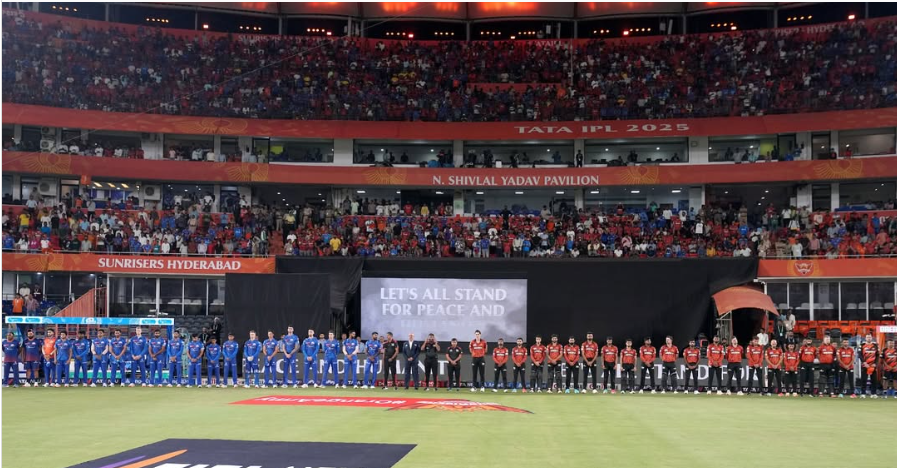
By Trisha Ghosal
The floodlights at the Rajiv Gandhi International Stadium in Hyderabad lit more than just a cricket ground last night — they illuminated the soul of a nation. Hours after the terror attack in Pahalgam tried to fracture India’s spirit in the name of religion, the Indian Premier League (IPL) responded not with noise, but with silence. It wasn’t the silence of defeat. It was the silence of strength, of resilience, of a country choosing unity over hate.
Before a single ball was bowled in the clash between Sunrisers Hyderabad (SRH) and Mumbai Indians (MI), something remarkable took place. The electric atmosphere of the IPL — known for its roars and revelry — came to a halt. For one minute, tens of thousands stood in absolute silence. No chants, no fireworks, no celebration. Just shared sorrow. In that moment, there were no fans of rival teams. There were only Indians, united in grief and resolve.
Sport, at its purest, has the power to bridge what politics and prejudice often divide. And last night, it did exactly that.
Hardik Pandya and Pat Cummins, captains on opposite ends of the rivalry, stood shoulder to shoulder at the toss, setting the tone. Their words weren’t scripted platitudes — they were genuine expressions of mourning and condemnation. As they spoke, they didn’t represent franchises. They represented a collective conscience. The black armbands that every player, official and commentator wore were not just symbolic. They were declarations — that no matter what faith they belonged to, they were Indians first. That cricket, more than just a game, could be a voice for unity.
In the wake of a tragedy fuelled by the politics of religion, Hyderabad’s stadium became a sanctuary of secularism. No religion barred the thousands from standing together in that moment. No belief stopped them from bowing their heads. The loudest and most powerful defence of India’s secularism came not from Parliament, but from the pitch.
There were no cheerleaders. No music blasted from the speakers. Even the fireworks — the IPL’s trademark extravagance — were left unlit. Because grief doesn’t need a spectacle. It needs space. And the IPL, to its immense credit, made room for the nation’s pain.
For young fans watching at home, the lesson was unforgettable: patriotism isn’t always in slogans or salutes. Sometimes, it’s in silence. Sometimes, it’s in the tear that falls unnoticed in a crowd. Sometimes, it’s in the captain who speaks not of strategy, but of solidarity.
This wasn’t just a match. It was a mirror. It reflected the best of what sport — and by extension, India — can be. In a time when division is often louder than dialogue, cricket did what few institutions manage: it united us.
Last night, the IPL reminded us that in moments of grief, it’s not our differences that define us — it’s our shared humanity. On that field, religion didn’t divide. Region didn’t matter. Jersey colours blurred. There was only one identity: Indian.
And maybe, just maybe, that’s the biggest six the IPL has ever hit



